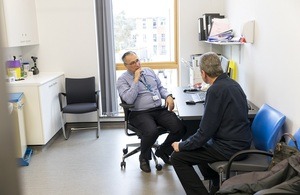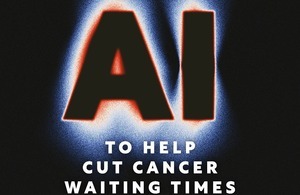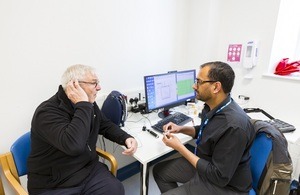Thousands of men’s lives could be saved, and their loved ones spared the tragedy of losing someone to cancer, as a major new prostate cancer screening trial is set to get under way in the UK backed by £42 million from the government and Prostate Cancer UK.
The first-of-its-kind trial – called TRANSFORM – will use innovative screening methods like an MRI scan to detect prostate cancer, and it will see hundreds of thousands of men across the country participating.
Prostate cancer is the most common cancer in men in the UK and has no screening programme. It usually has no symptoms until it has grown large and may be more difficult to treat and, sadly, 12,000 men die of it every single year.
A way of effectively screening for prostate cancer could find these men before their cancer spreads and save their lives.
The trial has the potential to see new screening methods give more accurate results than the current blood tests, which can miss some cancers and often suggest prostate cancer when no cancer exists.
Crucially, screening could also spot the disease even when no symptoms are displayed.
Health and Social Care Secretary Victoria Atkins said:
Cancer survival rates continue to improve in the UK, with the disease being diagnosed at an earlier stage more often. But more must be done.
Our hope is that this funding will help to save the lives of thousands more men through advanced screening methods that can catch prostate cancer as early as possible.
Laura Kerby, Chief Executive at Prostate Cancer UK, said:
12,000 men die of prostate cancer each year and it’s the most common cancer that doesn’t have a national screening programme.
It’s about time that changed. That’s why we’re launching our biggest and most ambitious trial ever. It will finally give us the answers we need to develop a routine testing system and save thousands of men each year.
Prostate Cancer UK’s unique focus and expertise made us the only organisation that could really deliver this paradigm-shifting trial, and we’re delighted that the government has backed our vision to revolutionise diagnosis.
One in 4 black men will develop prostate cancer – double the risk of other men. Therefore, to ensure the trial helps reduce their risk of dying from this disease, 1 in 10 men invited to participate will be black men. Participating men in the screening trial will be aged 50 to 75, with black men eligible from the lower age range of 45 to 75.
Men at higher risk of prostate cancer due to age and ethnicity will be recruited through their GP practice and invited to a screening visit.
More than 52,000 men are diagnosed with prostate cancer every year in the UK on average – that’s 144 men every day. Around 490,000 men are currently living with and after prostate cancer.
Sports broadcaster Steve Rider, 73, shared his prostate cancer diagnosis last month:
It was from talking with friends that I explored my risk of prostate cancer. I didn’t have any symptoms and wasn’t expecting to be diagnosed.
Luckily, my cancer was all contained within the prostate, giving me the opportunity to have significant surgery to deal with it, but for too many men they are diagnosed late.
£16 million will be invested by the government for the trial through the National Institute for Health and Care Research (NIHR) and Prostate Cancer UK, who have led the development of the trial, will provide £26 million. The trial is due to start in spring 2024 with recruitment likely to begin in autumn 2024.
The government has already opened 127 community diagnostic centres to offer quicker, more convenient checks outside of hospitals for conditions such as cancer, with over 5 million additional tests delivered so far.
The major conditions strategy will also consider the prevention, diagnosis, treatment and management of conditions including cancer. The UK is already working with world-renowned scientists to deliver new cancer vaccine trials and is growing the size of the specialist workforce.
Daniel Burkey, 58, from Yorkshire, was diagnosed with advanced prostate cancer in June 2021. He said:
Men need prostate cancer screening so that if we’ve got it, we can find out early enough to treat it and get rid of it. I got my diagnosis in my fifties, and the doctor told me the horrible news that it can’t be cured.
It was an awful shock, and I still find it hard to accept that I’ll always have this disease, but I’m doing everything I can to control the cancer with chemotherapy, radiotherapy and 2 kinds of hormone therapy; one by injection, one orally.
Things could have been different if I’d been tested routinely and caught it early enough. If the UK gets prostate cancer screening, so many lives will be saved. Knowing that this trial is going to find a way to do that makes me optimistic for other men.
Professor Lucy Chappell, NIHR Chief Executive, said:
New research into harnessing innovative screening methods is crucial in finding ways to detect this serious disease earlier, in the race against time to save lives.
That’s why setting up this landmark new trial in partnership between NIHR and Prostate Cancer UK is so important.
Together we can aim to generate high quality long-term evidence to benefit men at risk of developing this condition, and to inform those who plan and deliver NHS services of how best to test for the disease.















